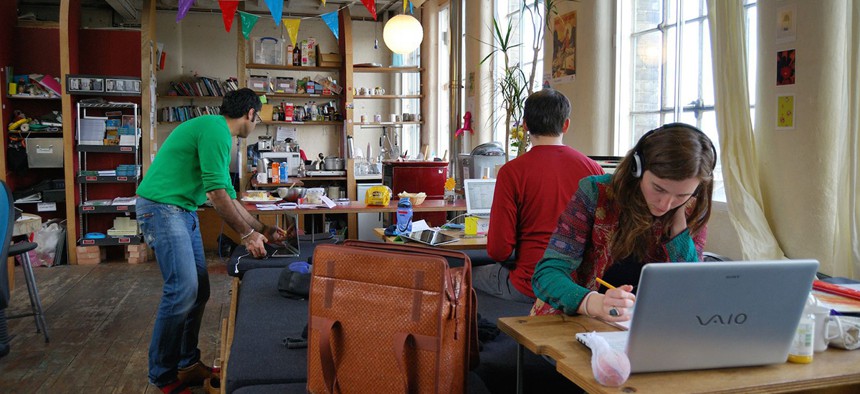Silicon Valley’s Co-Working Boom Is No Cure For its Crushing Loneliness

Flickr user Impact Hub
In a city where every coffee shop has high-speed Wi-Fi, why has co-working taken off?
"Silicon Valley" may be satire, but the HBO television show hits eerily close to home for many people in the technology and startup worlds. Among the many things it gets right is the tech world’s obsession with co-working spaces.
On the show, the absurdly arrogant yet lazy Erlich Bachman runs his own incubator, inviting founders to live and work in his home. Eventually, he gets some competition from Big Head, a similarly aimless character who turns his newly purchased mansion into another incubator.
The real world has also seen an explosion in co-working spaces since WeWork came on the scene in 2010. Silicon Valley is at the forefront of this trend. But in a city where every coffee shop has high-speed Wi-Fi, and even cultural centers like 111 Minna Gallery are functional offices, why has co-working taken off?
The answer can be found in Erlich. If there’s one thing Erlich’s character represents, it’s loneliness. Beneath all the bravado, he’s looking for companionship and human connection. And the same is true of the real-life entrepreneurs in San Francisco and now around the world.
Entrepreneurship is characterized by a series of extreme highs and lows. For many founders, pursuing their dreams requires giving up a lot—especially in terms of relationships. The combination of creativity and hustle required for success results means working a lot of late nights and weekends. The constant grind can wear anyone down. We miss birthday parties and push back drinks with friends, skip family vacations and eventually, the invitations themselves taper off. A sense of isolation begins to sink in.
While some entrepreneurs have begun to talk openly about their struggles, the vast majority refuse to even acknowledge these feelings to themselves. The default mechanism for many entrepreneurs is to see any emotional lows as weakness and try to suppress or ignore them. We tell ourselves that we’re too tough to be lonely, that there’s no time for relationships, that we need to stop feeling and focus on solving problems.
But our actions tell a different story. I think the craze for building new co-working spaces is just a manifestation of the loneliness entrepreneurs face. Many in the industry have accepted the reality of their lifestyles and are looking for kindred spirits—people who will understand, and relate to, their priorities. Co-working spaces are a way to hang out with the kind of people who won’t be disappointed when dinner gets canceled for the fifth time in a row.
The thinking here is that no one besides another entrepreneur could possibly understand the struggle. As Ray Hennessey suggests in an article for Entrepreneur, founders crave the community, acceptance and support that co-working can provide.
Now, the concept of co-working is being extended to co-living spaces like WeLive, wherein young, ambitious types focused on success at all costs can mingle with other people who are just like them. Normally, the very concept would be considered an abomination of work-life balance. But for those who have no balance, it’s mecca.
The problem is that co-working and co-living spaces are more of a Band-Aid than a real solution to the problems faced by founders in Silicon Valley. Rather than alleviating the symptoms by surrounding ourselves with like-minded people, we need to solve the actual problem and change our lifestyles and expectations. Working hard shouldn’t mean abandoning the rest of your life. Being an entrepreneur shouldn’t mean losing the people who have any expectations of you.
Unfortunately, changing this narrative is not easy—there is no single solution for it. But entrepreneurs can start by being more introspective. To achieve professional and personal fulfillment, we have to understand what drives us—the good and the bad. We have to take care of ourselves. And we have to identify the things that make us come alive and prioritize them.
Unlike many of my introverted friends, I gain energy when I talk to people—especially those who are close to me. I know that if I don’t focus on the relationships that matter most to me, I’ll spiral. Others might need time outdoors, making music, or cooking.
In some ways, then, co-working spaces are counterproductive. They surround entrepreneurs with other people who also disregard their limitations and needs. That’s not to say co-working is bad, but rather it can perpetuate a problem for many entrepreneurs. The benefits of co-working spaces can only be realized when entrepreneurs have a life outside of them.
NEXT STORY: New HHS CIO to Focus on Cyber





